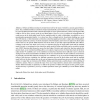Free Online Productivity Tools
i2Speak
i2Symbol
i2OCR
iTex2Img
iWeb2Print
iWeb2Shot
i2Type
iPdf2Split
iPdf2Merge
i2Bopomofo
i2Arabic
i2Style
i2Image
i2PDF
iLatex2Rtf
Sci2ools
197
click to vote
FSE
2011
Springer
2011
Springer
On Cipher-Dependent Related-Key Attacks in the Ideal-Cipher Model
Abstract. Bellare and Kohno introduced a formal framework for the study of related-key attacks against blockciphers. They established sufficient conditions (output-unpredictability and collision-resistance) on the set of relatedkey-deriving (RKD) functions under which an ideal cipher is secure against related-key attacks, and suggested this could be used to derive security goals for real blockciphers. However, to do so requires the reinterpretation of results proven in the ideal-cipher model for the standard model (in which a blockcipher is modelled as, say, a pseudorandom permutation family). As we show here, this is a fraught activity. In particular, building on a recent idea of Bernstein, we first demonstrate a related-key attack that applies generically to a large class of blockciphers. The attack exploits the existence of a short description of the blockcipher, and so does not apply in the ideal-cipher model. However, the specific RKD functions used in the attack are provably o...
Bellare | Cryptology | Formal Framework | FSE 2011 | Rkd |
| Added | 28 Aug 2011 |
| Updated | 28 Aug 2011 |
| Type | Journal |
| Year | 2011 |
| Where | FSE |
| Authors | Martin R. Albrecht, Pooya Farshim, Kenny G. Paterson, Gaven J. Watson |
Comments (0)

